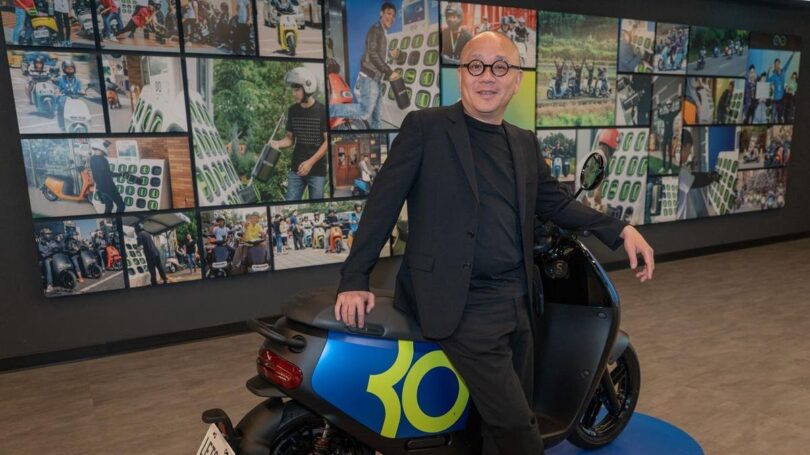For nearly a decade, Taipei-based Gogoro has steadily built a network of more than 2,500 battery-swapping stations across the island that help power 90% of its domestic two-wheelers. Now, Gogoro aims to replicate its domestic success abroad.
Taipei-based electric scooter and battery maker Gogoro is going full-speed ahead with efforts to expand globally.
The battery-swapping pioneer’s strategy is to target “big markets with big potential” and also “big problems to solve,” which is to tackle severe congestion and pollution issues, Gogoro’s cofounder, chairman and CEO Horace Luke tells Forbes Asia in an interview at its Taipei headquarters.
“We all live on this blue planet, and if Asia is not better, none of the other parts of the world get better either,” says Luke. “We focus on where the pollution is actually being generated every day today in the heart of these megacities across Asia.”
The global electric vehicle market was valued at $385 billion in 2022 and is projected to grow to $500 billion in 2023 and $1.6 trillion by 2030, Fortune Business Insights forecasted.
Luke has identified international expansion as a crucial focus area for the year 2023. In March, it partnered with food-delivery company Zomato and Kotak Mahindra Prime in India to offer affordable loan terms to food delivery riders who use electric two-wheelers. In May, it expanded its partnership with Bikebank in South Korea to scale up their battery swapping network to seven additional cities other than Seoul.
Gogoro’s electric scooter users have completed over 480 million battery swaps to date, with more than 400,000 swaps happening every day.
Shanshan Kao/Forbes Asia
Gogoro now operates in nine markets. In addition to its presence in India and Indonesia in 2021, the company landed in Singapore, Israel and the Philippines last year by collaborating with industry leaders, including Jardine Matheson’s Jardine Cycle & Carriage in Singapore, Metro Motor and Paz Group in Israel, and Filipino billionaire Jaime Zobel de Ayala’s Ayala Group in the Philippines.
Horace Luke swapped his job as chief innovation officer at smartphone maker HTC to launch electric scooter and battery maker Gogoro in 2011.
Shanshan Kao/Forbes Asia
The Hong Kong-born, America-raised entrepreneur founded the company in 2011 with Matt Taylor in Taiwan, a historic tech powerhouse known for its rich talent pool and robust supply chain. “I’ve always seen Taiwan as an innovator’s heaven. That, if I can imagine it, I can build it here,” Luke says.
With a background in industrial and furniture design, Luke started his career at Nike doing brand and image design. He later joined Microsoft, where he helped design its Xbox and Windows XP before he became the chief innovation officer at smartphone maker HTC. Throughout his journey, he found out that technology needs to help the planet in its ability to grow in a sustainable way. The 2,000-strong company designs and builds almost everything in Taiwan except the battery cells.
“I founded Gogoro to really change how cities of tomorrow can create technology solutions to help them grow in a sustainable way.”
A Gogoro charging station in Datong District, Taipei.
Shanshan Kao/Forbes Asia
Gogoro’s backers include Singapore state-investment firm Temasek, former U.S. Vice President Al Gore’s Generation Investment Management and Yin Chung-yao, son of Samuel Yin, the billionaire chairman of Taiwan conglomerate Ruentex Group.
Taiwan has the world’s highest concentration of scooters. The 36,197-square-kilometer island has more than 14 million registered two wheelers roaming on the streets–roughly six in 10 people own one. This provides a prime testing ground for Gogoro’s innovative transportation solutions. It also tags along with government policies that prioritize sustainable means to travel. By 2040, all cars and motorcycles sold locally will be electrified as part of Taiwan’s ambitious net-zero goal.
Scooters stream onto Minquan West Road of Datong District from Taipei Bridge during morning rush hour.
Shanshan Kao/Forbes Asia
Buying a brand new electric scooter while trading-in a gas-powered one qualifies for an allowance of up to NT$28,800 ($910) under the government’s subsidy schemes. For as low as NT$319 per month, riders can subscribe to Gogoro’s battery swapping system. They can leave their depleted battery for a fully charged one at swapping stations almost instantly without needing to wait for them to charge.
Taiwanese government provides a subsidy of up to NT$28,800 ($925) for individuals who choose to replace a scooter with a new electric scooter.
Shanshan Kao/Forbes Asia
“Electric mobility is inevitable,” says Luke. “It will happen. The question is how fast and how would it happen.”
Today, Gogoro accumulated over 480 million battery swaps in total and its network supports nearly 400,000 battery swaps a day, by over 526,000 riders. Its removable battery packs power 90% of the domestic two-wheelers through over 2,500 swapping stations, which outnumbered gas stations in Taiwan.
What makes Luke wake up with a smile every day is when he sees little kids helping the parents swap a battery at the station.
“You don’t see a kid helping a parent go to a petrol station, get the nozzle out and put the gas in. But with the battery swapping, they do. And that really helps us get confirmation that we’re doing something right,” Luke says. “We’re working for the future generation. And hopefully by the time we get old and we’re ready to leave the Earth, we’re leaving it a better place.”








